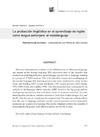Identificador persistente para citar o vincular este elemento:
https://accedacris.ulpgc.es/jspui/handle/10553/11204
| Campo DC | Valor | idioma |
|---|---|---|
| dc.contributor.author | Arnaiz Castro, Patricia | en_US |
| dc.date.accessioned | 2014-01-14T03:30:22Z | - |
| dc.date.accessioned | 2018-03-15T14:26:28Z | - |
| dc.date.available | 2014-01-14T03:30:22Z | - |
| dc.date.available | 2018-03-15T14:26:28Z | - |
| dc.date.issued | 2012 | en_US |
| dc.identifier.issn | 1133-1127 | en_US |
| dc.identifier.other | WoS | - |
| dc.identifier.uri | https://accedacris.ulpgc.es/handle/10553/11204 | - |
| dc.description.abstract | This case study presents evidence of the different ways in which metalanguage can appear in the foreign language (FL) classroom and of the benefits that interactions including reflection upon language can provide to language learning in a group of 4º ESO students. The roles played by output and metalanguage in the second language (L2) learning process has been examined by many studies (Gass and Mackey, 2007; Lyster and Ranta, 1997; Lyster & Saito, 2010; Swain, 1995, 2000; Swain and Lapkin, 1998). The data presented here correspond to an analysis of the language related episodes (LRE) found in the big group and the small group interactions that took place in the 21 sessions observed. To solve their linguistic problems, students resorted to both their mother tongue (L1) and the FL with the aim of completing the assigned task. The episodes collected show how the use of language activates certain mental processes and consequently represents an occasion for learning. The results obtained confirm the benefits of increasing the frequency with which students use the FL in class. | en_US |
| dc.format | application/pdf | - |
| dc.language | spa | en_US |
| dc.relation.ispartof | LFE. Revista de Lenguas para Fines Específicos | en_US |
| dc.source | LFE. Revista de lenguas para fines específicos [1133-1127], n. 18, 2012, p. 157-182 | en_US |
| dc.subject | 570107 Lengua y literatura | en_US |
| dc.subject | 550510 Filología | en_US |
| dc.subject.other | Output | en_US |
| dc.subject.other | Foreign language learning | en_US |
| dc.subject.other | Feedback | en_US |
| dc.subject.other | Metalanguage | en_US |
| dc.title | La producción lingüística en el aprendizaje de inglés como lengua extranjera: el metalenguaje | en_US |
| dc.title.alternative | The linguistic production in the learning of English as foreign language: metalanguage | en_US |
| dc.type | info:eu-repo/semantics/article | en_US |
| dc.type | Article | en_US |
| dc.identifier.isi | 000219403200007 | - |
| dc.compliance.driver | 1 | - |
| dc.identifier.absysnet | 233536 | - |
| dc.identifier.eissn | 2340-8561 | - |
| dc.description.lastpage | 182 | en_US |
| dc.description.firstpage | 157 | en_US |
| dc.relation.volume | 18 | en_US |
| dc.investigacion | Artes y Humanidades | en_US |
| dc.rights.accessrights | info:eu-repo/semantics/openAccess | - |
| dc.type2 | Artículo | en_US |
| dc.contributor.daisngid | 1991760 | - |
| dc.description.numberofpages | 26 | en_US |
| dc.utils.revision | Sí | en_US |
| dc.contributor.wosstandard | WOS:de Castro, PA | - |
| dc.date.coverdate | 2012 | en_US |
| dc.identifier.ulpgc | Sí | en_US |
| dc.description.esci | ESCI | |
| dc.description.erihplus | ERIH PLUS | |
| item.fulltext | Con texto completo | - |
| item.grantfulltext | open | - |
| crisitem.author.dept | GIR IDETIC: División de Traducción e Interpretación y Aprendizaje de Lenguas | - |
| crisitem.author.dept | IU para el Desarrollo Tecnológico y la Innovación en Comunicaciones (IDeTIC) | - |
| crisitem.author.dept | Departamento de Didácticas Específicas | - |
| crisitem.author.orcid | 0000-0001-5987-8254 | - |
| crisitem.author.parentorg | IU para el Desarrollo Tecnológico y la Innovación en Comunicaciones (IDeTIC) | - |
| crisitem.author.fullName | Arnáiz Castro, Patricia | - |
| Colección: | LFE, Rev. leng. fines específ. n.18, 2012 Artículos | |
Visitas 1
26.949
actualizado el 16-ene-2026
Descargas
849
actualizado el 16-ene-2026
Google ScholarTM
Verifica
Comparte
Exporta metadatos
Los elementos en ULPGC accedaCRIS están protegidos por derechos de autor con todos los derechos reservados, a menos que se indique lo contrario.
